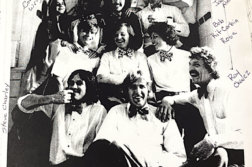In Defense of Harry Hay’s Essentialism
To the Editor:
What struck me first about Jay Michaelson’s article on gay essentialism (“The Non-essential(ist) Harry Hay”) in the March-April issue was its mean-spiritedness. Michaelson portrays essentialism as an outmoded refuge of well-meaning but callous, aging bigots. He does this with an oily civility—the noblesse oblige of one who knows he can take for granted that his view is blessed by the authority of academia, while the essentialism of his targets has been all but banished from the ivory tower. It is convenient, too, that his main target is an easy one—the visionary Harry Hay, whose importance has always resided more in his ability to appreciate and convey gay spirit than in philosophical sophistication. Michaelson suggests that by focusing on Hay he is only addressing “naïve essentialism,” but it is clear that his attack is directed at gay essentialism in general. And because of their severity, his charges against it should be carefully evaluated.
Michaelson paints a false portrait of all gay essentialism as naïve and intellectually indefensible, for example, by characterizing it as a philosophy of rigid absolutes. In his version of essentialism, all gays must be one way and all heterosexuals another, with no overlap. It is a straw man argument; anyone can observe that human traits are spread throughout the population as a spectrum. This must include such gay-related traits as subject-subject consciousness, a camp sensibility, engagement with the psyche, and transcending gender binaries. Many heterosexual people are blessed with these traits in abundance, but this does not negate the fact that lesbians and gays seem to be particularly endowed in these areas.
Sophisticated gay essentialism views these attributes not as the exclusive possession of lesbians and gays, but rather as traits that tend to be innately intensified among us. Such tendencies are difficult to name or measure, but many people (including many straight people) will vouch for how it feels undeniably different to be among gay people or in gay spaces, such as a pride parade, not to speak of a faerie gathering. Furthermore, how can one witness the disproportionately significant contributions that gays and lesbians have made to human culture and not wonder whether these contributions spring from some innate potential? Even if such observations cannot offer any final proof in favor of gay essentialism, they are powerfully suggestive, and it seems to me that some form of essentialist theory is almost certainly true.
Michaelson also attacks the liberationist spirit of gay essentialism by portraying it as an oppressive theory, the province of narrow-minded bigots. To me, this is the most disturbing part of his attack, since such claims can have a particularly chilling effect on the thinking of those essentialists (and potential essentialists) who care most deeply about the rights and well-being of transgender people, lesbians, bisexuals, and other sexual minorities. In support of his view he marshals a series of nasty anecdotes, and I wonder if they actually square with most people’s experiences of gay essentialists. Certainly they do not reflect mine. Regardless, his anecdotes obscure the fact that he offers no intellectual or empirical support for a view of gay essentialism as a bigoted stance—only insinuations. Is it bigoted or oppressive to value gayness and to acknowledge that many aspects of our peculiar queer nature are probably innate? On the contrary, gay essentialism has both emerged out of and is an important contributor to the larger project of human liberation overall. If essentialism is true, and certain valuable traits really are linked with gayness, then any liberation that is real liberation must not deny this link.
Michaelson argues that identifying such links will weaken our coalitions with other minority groups, but it seems to me that we need coalitions that can embrace our peculiar strengths, contributions, and values. Coalitions built upon a denial of these qualities are bound to facilitate only a partial liberation, still relegating to the shadows everything that makes us most gay.
By slandering gay essentialism, Michaelson seeks to marginalize ideas that are not only valid and liberating, but also important for understanding ourselves as gay people. Without an essentialist perspective, we will surely fail to recognize the meaning of our peculiar homosexual heritage. It is well known that disproportionate numbers of same-sex loving people have served as spiritual leaders in indigenous cultures and that many gays and lesbians possess exceptional creative gifts. But what are we to make of such facts? On the basis of an essentialist theory we can ask ourselves: If my forbears had those strengths, might not I also possess them in potential? Only on this theoretical basis can we begin to feel the greater ethical importance of developing these potentials and awakening to the promise inherent in being born queer. Thus by cultivating an increasingly sophisticated and accurate gay essentialism, we may take part in a sacred myth of meaning that is life-affirming as well as coherent and empirically sound.
Bryce Way, Los Angeles, CA
Jay Michaelson responds:
In 2013, it is almost quaint to read an actual defense of essentialism. I did not excessively elaborate on this view in the article because, as Mr. Way notes, it is universally condemned among scholars—who inhabit not ivory towers, after all, but libraries. If such essentialism provides Mr. Way with a “sacred myth of meaning,” then I certainly do not want to disturb that.
However, essentialism marginalizes any people in the in-group who do not possess its essential characteristics, denigrates the out-group for not having these characteristics, and omits from history all those who do not fit its neat categories. (Given same-sex eroticism among Samurai, Spartan Warriors, and Hitler Youth, perhaps militarism is one such category? Or maybe not.) Alas, Harry Hay, a hero of mine, often demonstrated these very tendencies. To point them out is not to craft a straw man but to draw a fuller portrait of a visionary individual who, like all of us, had his blind spots.
Why Aaron Swartz Was Being Pursued
To the Editor,
Thank you so much for the article and profile on Aaron Swartz in the March-April issue of GLR. It stated the facts exactly as they were, no judgment, no commentary. I think it is interesting that Swartz has had sex with guys on occasion, and that is the way it was, no identity politics involved. I think more and more young people see things that way.
However, I did want to let you know that you made a typo when referring to the database that Swartz was caught downloading at Harvard. It is jstor, not gstor, shorthand for “Journal Storage.”
Much has been made, but not by you, of “prosecutorial overreach” on the part of the government for pursuing Swartz for downloading and disseminating material from the jstor database, because he thought “information wants to be free.” While Aaron was a very bright young man, he was also a bit naïve, too, I think. Jstor is a private commercial enterprise that one pays money to use, and he was basically stealing it.
Jstor is a database of entire runs of periodicals that people were hired to digitize, page by page, back to the first issue. (For example, Musical Quarterly goes back to 1915, and people were hired to photograph each page of each issue from the beginning.) As a librarian here at Swarthmore for forty years, I know all about jstor. We were one of five beta testing sites for jstor when it first came out. We roped off certain periodicals in the stacks (although people were allowed to use them if they really wanted to), the stack workers kept statistics on what they reshelved of these limited titles, and announcements were made of the availability of these titles as now being available on line. We bought a computer for placement in the Economics Department, for instance (back in the days before everyone had then in their offices!) to encourage the faculty to look up their periodicals on line, to get them used to the idea that they didn’t need to come to the library to see the hard copy.
Swarthmore even supplied certain rarely available issues of periodicals that we owned to the jstor people for digitization. This all cost money and time. Money is needed to pay for the computer storage needed to maintain all these huge digitalized files. Libraries pay annual subscriptions for journals they want to acquire in digital form via jstor. The money supports the continual digitalization of more issues and the preservation of the past files.
Swartz thought all this should be free to everyone, and so he was downloading, secretly, jstor files from the Harvard library system and putting them out on the Web for everyone in the world to use. He didn’t grasp the idea that once everything was out there freely available, no library would need to subscribe to any of this, no money would be coming in to run the storage computers, the entire thing would shut down, and no one would have it at all. What he was doing was also against the law, so he was arrested and prosecuted. People have been saying that he killed himself because he was being unjustly picked on by the police. Who knows why he killed himself? But it certainly wasn’t for being unfairly prosecuted. He broke the law, and he must have known that.
George K. Huber, Swarthmore PA
A Little Respect for Ed Koch’s Privacy
To the Editor:
I am profoundly displeased with your “In Memoriam” tribute to Ed Koch [May-June 2013 issue]. Interviewer Matthew Hays was rude—proudly rude, insistently rude, and embarrassingly rude. As soon as he broached the subject, Koch stated: “My position about speaking about sexual orientation is that it’s a private matter. … I don’t discuss it.”
Interviewer: But you seemed to be willing to discuss it through appearances in these films.
Koch: No, I don’t think so at all. …
Interviewer: But billions of people know who you are. If you came out it would have tremendous impact.
Koch: I don’t discuss my sexuality. I don’t intend to discuss it with you.
The interviewer, shockingly, abusively arrogant, clearly feels he has a right to an answer. I want to suggest that The Gay & Lesbian Review try a new policy: politeness.
Paul H. Stacy, Bloomfield, CT





